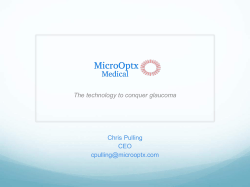
XEN Gel Stent for glaucoma treatment
Technology ALERT Horizon Scanning Centre February 2015 XEN Gel Stent for glaucoma treatment TECHNOLOGY The XEN Gel Stent is a glaucoma drainage implant developed by AqueSys, Inc, and distributed in the UK by Kestrel Ophthalmics Limited. Its aim is to reduce intraocular pressure (IOP) in patients with primary open angle glaucoma where previous medical treatments have failed. The XEN Gel Stent is a permanent, soft, collagenderived, gelatin implant. It is 6mm in length and is about the width of a human hair. It is placed through a small (approximately 1.6mm), self-sealing, corneal incision via a preloaded injector with a small 27g needle. Using an ab interno (from the inside) approach, the surgeon advances the inserter across the anterior chamber into the quadrant of the eye where implantation is planned. This small incision approach to glaucoma surgery is known as microinvasive glaucoma surgery (MIGS). Upon implantation the XEN Gel Stent creates a channel through the sclera allowing flow of aqueous humour from the anterior chamber into the subconjunctival space to reduce IOP. The pliability and softness allow it to conform to the ocular tissue. It can be used as a stand-alone procedure or in combination with cataract surgery. © Aquesys, Inc The XEN Gel Stent received a CE mark in November 2013 and the company are planning a stepwise commercial UK launch in 2015. Other microinvasive stents are in development, including the InnFocus MicroShunt™ by InnFocus Inc which also targets subconjunctival drainage. This shunt uses Mitomycin C to This alert presents independent research funded by the National Institute for Health Research (NIHR). The views expressed are those of the author and not necessarily those of the NHS, the NIHR or the Department of Health. NIHR Horizon Scanning Centre, University of Birmingham Email: nihrhsc@contacts.bham.ac.uk Web: www.hsc.nihr.ac.uk NIHR Horizon Scanning Centre modulate wound healing and implantation is via an ab externo fornix-based conjunctival incision. It is CE marked (January 2012), but no further information is available. POTENTIAL FOR IMPACT Primary open angle glaucoma is a chronic disease involving the trabecular meshwork, which is the area of tissue around the base of the eye responsible for draining the aqueous humour from the eye. It becomes partially blocked preventing the aqueous humour draining properly and raises IOP. Raised IOP is a major risk factor for the development of glaucoma, a family of conditions characterised by optic neuropathy manifested by the loss of optic nerve fibres. Current treatment of raised IOP initially involves a variety of drug treatments. If these do not work, a variety of surgical options can be considered. One of these is the use of glaucoma drainage implants (tube shunts), such as the XEN Gel Stent. The company claim the potential benefits of the XEN Gel Stent include a sustained reduction of IOP through the subconjunctival outflow pathway – making it the only MIGS procedure that bypasses all potential outflow obstructions. The company also claim that the XEN Gel Stent is designed to reduce the complications of traditional glaucoma surgery through the use of a quick (up to 10 minutes) and less invasive ab interno procedure. This type of procedure does not require conjunctival or scleral dissection, which reduces tissue trauma. As a result of this, the company state that there may be fewer postoperative complications and patient recovery may be faster. As there is no trauma or dissection to the conjunctiva, the tissue can also be re-treated in the future, if needed. The company state that the AqueSys gelatin used in the XEN stent is well accepted by the human body, and is non-inflammatory. They also claim that the soft gelatin material minimises complications (such as erosion and corneal endothelial damage) related to currently used synthetic materials. If clinical and cost effectiveness can be demonstrated, the XEN Gel Stent may offer an additional treatment option for patients with primary open angle glaucoma. This technology is predicted to have an impact on the following domain of the NHS Outcomes Framework (www.england.nhs.uk/resources/resources-for-ccgs/out-frwrk): Domain 2 - Enhancing quality of life for people with long-term conditions. EVIDENCE PUBLISHED PAPERS Lewis RA. Ab Interno approach to the subconjunctival space using a collagen glaucoma stent. Journal of Cataract & Refractive Surgery 2014;40(6):1301-1306. http://www.ncbi.nlm.nih.gov/pubmed/24943904 CONFERENCE POSTERS AND ABSTRACTS Rękas M, Lewczuk K, Jabloríska J et al. Two year follow-up data with a soft and permanent, minimally-invasive ab-interno subconjunctival implant in open-angle glaucoma subjects. European Society of Cataract & Refractive Surgeons, London 2014. Poster. http://www.escrs.org/London2014/programme/posters-details.asp?id=20885 Reitsamer H. Early results of a minimally-invasive, ab-interno gelatin stent in combination with a preoperative Mitomycin C injection for the treatment of glaucoma. European Society of Cataract & Refractive Surgeons, London 2014. Poster. 2 NIHR Horizon Scanning Centre http://www.escrs.org/london2014/programme/free-papers-details.asp?id=21471&day=0 Kersten-Gomez I and Dick H. First results of the innovative minimal-invasive glaucoma surgery technique: the AqueSys Aquecentesis procedure. European Society of Cataract & Refractive Surgeons, Milan 2012. http://www.escrs.org/milan2012/programme/free-paper-details.asp?id=14101&day=0 Arciniegas-Perasso CA.Marí-Cotino JF, Vila-Arteaga J et al. XEN implant: Our experience in the first 19 patients. European Glaucoma Society, France 2014. Abstract P300. http://www.oic.it/~egsnice2014/documenti/abstracts/P300.pdf ONGOING STUDIES ClinicalTrials.gov. A prospective, multicentre clinical trial designed to evaluate the safety and performance of the AqueSys XEN 45 glaucoma implant in subjects with refractory glaucoma. https://clinicaltrials.gov/ct2/show/NCT02036541 ClinicalTrials.gov. Post market multicentric evaluation of the AqueSys XEN implant in moderate primary open angle glaucoma subjects. https://clinicaltrials.gov/ct2/show/NCT02006693 COMPANY INFORMATION The company have completed enrolment of a 20 site 220 eye European phase IV study and are currently in the enrolment phase of a clinical study within the US. INFORMATION FROM This Alert is based on information from the company and a time-limited internet search. 3
© Copyright 2025




















